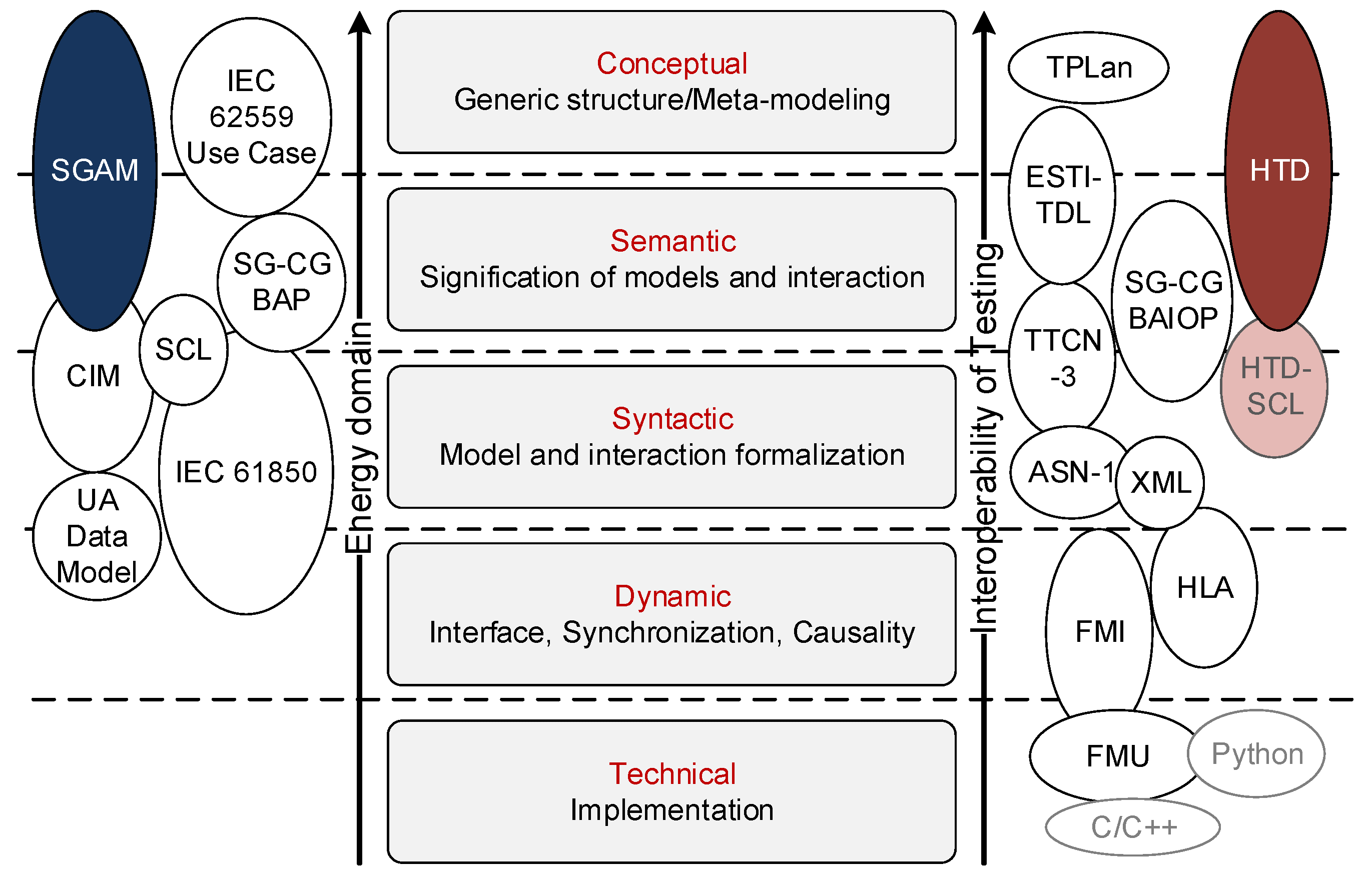![[Translate to english:]](/fileadmin/_processed_/5/2/csm__c__shutterstock_metamorworks_683800897_a75dc43e6e.jpg)
Holistic Testing and Validation
A holistic testing and validation approach in a realistic environment can ensure prototype performance, interoperability, and reliability.
At the Smart Grid Testing Group, we are dedicated to advancing testing and validation methodologies, from conceptual testing to integration testing. Prior to deployment, validating systems in a realistic laboratory environment is critical to ensure performance and reliability. This process begins with stakeholders defining use cases to address specific challenges and identify effective solutions. While use cases focus on high-level system interactions, detailed test cases are subsequently developed to evaluate how well the system or its components perform as expected.

Abstraction layers of a holistic test and the related standards.
[Source: Heussen, K., Steinbrink, C., Abdulhadi, I. F., Nguyen, V. H., Degefa, M. Z., Merino, J., Jensen, T. V., Guo, H., Gehrke, O., Bondy, D. E. M., Babazadeh, D., Pröstl Andrén, F., & Strasser, T. I. (2019). ERIGrid Holistic Test Description for Validating Cyber-Physical Energy Systems. Energies, 12(14), 2722. doi.org/10.3390/en12142722]
Typically, use cases are established during the requirements analysis phase to capture the functional needs of a system. Once these are defined, corresponding test cases are developed to assess the system’s ability to overcome the identified challenges. To enhance the efficiency and accuracy of this process, we are leveraging historical testing data and incorporating AI-enhanced testing methods to tackle the challenges of scalability, reproducibility, repeatability, and uncertainties for testing.
Our automation laboratory infrastructure is equipped with industrial components and protocols, enabling the design and execution of test cases in a realistic environment. This includes capabilities ranging from offline simulations to real-time simulations and emulations, ensuring a thorough evaluation of system performance.
Flagship Projects
ERIGrid Project
The ERIGrid 1 and ERIGrid 2 projects laid the groundwork for a comprehensive testing and validation framework for smart grids. Our research group leverages this extensive knowledge to advance our testing methodologies. Since there is no one-size-fits-all solution in testing, each test setup is customized tailored to the requirement. We focus on a holistic testing approach considering interdependencies within systems under test. Utilizing a use case template and/or a holistic test description can assist users in defining experiment details, ultimately improving the quality of experiment planning, execution, and documentation for complex multi-domain energy systems.
Industrial project: Conceptual Design and Testing
Our research group provides consultancy services to industrial partners. For example, developing conceptual designs and conducting real-time testing for system integrity protection with a focus on communication architectures and protocols. Even at the initial design stage, we performed hardware-in-the-loop testing with generic industrial devices to perform proof-of-concept evaluations. This included comparing communication performance across different architectures using IEC 61850 protocols. We provided proof-of-concept real-time validation results, including functional and non-functional requirements for devices and systems, to support detailed engineering designs in subsequent stages.
Contact
Publications
- A Toolbox for Design of Experiments for Energy Systems in Co-Simulation and Hardware Tests
- Energy Systems Test Case Discovery Enabled by Test Case Profile and Repository
- Towards Automation of Configuration Management for Multi-Research Infrastructure Experiments
- Operational testing of virtual and physical IEDs using GOOSE for protection application
More Information
![[Translate to english:]](/fileadmin/_processed_/5/2/csm__c__shutterstock_metamorworks_683800897_a75dc43e6e.jpg)
Projects 
A
Ability
Haptic Tablet For The Accessibility of Digital Content to the Visually Impaired
Duration: 2022 - 2025 AgenC
Automatische Generierung von Modellen für Prädiktion, Testen und Monitoring cyber-physischer Systeme
Duration: 2022 - 2025C
CARESS
CARESS Clinical and Epidemiological Cancer Data Warehouse System and Tooling
Duration: 1995 - -0001 CIRC-UITS
Circular Integration of independent Reverse supply Chains for the smart reUse of IndusTrially relevant Semiconductors
Duration: 2023 - 2025